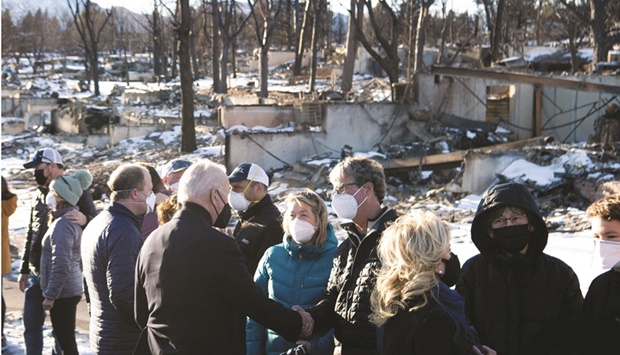Some asked to hug, others got hugged without asking and one man, wearing the only clothes he had left, just clasped hands with Joe Biden as the US president made an emotional tour on Friday of a devastating Colorado wildfire.
Surrounded by apocalyptic damage from the inferno, Biden sought to comfort locals.
The 79-year-old Democrat has long been famous for his ability to show empathy with the suffering and his powers were on full display as he moved along a line of families and firefighters in Louisville, which burned to cinders in the December 30 Marshall Fire.
Under bright sunny skies, the president and First Lady Jill Biden walked through a flame-ravaged Louisville neighbourhood where blackened rubble and scorched tree trunks poked through a blanket of snow.
“We lost everything,” a man told the Bidens.
“I’m not even properly dressed because this is all I have,” the man said, gesturing at his long shorts.
“We definitely need help,” said the man’s son, who was also dressed in shorts, despite the snow lying over the blackened ruins of the neighbourhood.
Biden held the father’s hand for a long time, and after shaking hands with a dozen firefighters, gave them all ceremonial coins.
One woman looked at Jill Biden and said, “May I?” and then embraced her.
Biden put his arms around others.
“We’ll get through this,” one of the local men said.
Two people were missing and feared dead after the wind-driven, prairie-grass fire incinerated more than 1,000 dwellings on December 30-31, making it the most destructive Colorado blaze on record in terms of property losses.
The fire in Boulder County, on the northern outskirts of the Denver metropolitan area, charred 6,000 acres and laid waste to parts of Louisville and the adjacent town of Superior.
Fanned by gale-force winds, the flames at times devoured football field-size stretches of drought-parched landscape in seconds.
Biden later made remarks from a local recreation centre, where he said “there’s nothing so frightening, in my view,” as fire.
“I can’t imagine what it’s like to be here in this neighbourhood and see winds whipping up to 100 miles (160km) an hour and see flames approaching,” he said.
Addressing first-responders and members of the community, Biden said he was as moved by the scope of devastation he saw as he was by “the incredible courage and resolve that you all show”.
“We’re going to make sure that everything you need occurs,” Biden told the crowd.
Referring to huge wildfires around the country in an age of climate change, the president said “more land has burned in the United States ... than make up the entire, in terms of total acreage, as the entire state of New Jersey”.
“The situation is a blinking code red for our nation,” he added, referring to unusually high winds and the late arrival of snow as responsible for creating “a tinder box”.
“We can’t ignore the reality that these fires are being supercharged, they’re being supercharged” by climate change.
Biden said that families had asked him: “What do we do now?”
“Well, hang on to one another,” he said in response, recalling his long history of family tragedy when he said he had been “through” things.
“That’s the way. Find purpose in what you’ve been through.”
The president also used the occasion to make a pitch for his chief legislative initiative, the Build Back Better Act, which would funnel billions of dollars to enhanced forest management, firefighting and efforts to reduce carbon emissions.
The bill, opposed by Republicans, passed the Democratic-controlled House of Representatives in November.
It must still clear the Senate, where it has yet to secure the needed support of all of Biden’s fellow Democrats.
While acknowledging such measures offer no immediate solace to survivors of last week’s fire, he said that greater investments in renewable energy would spur major job growth while addressing the looming threat of more climate-related calamities.
Biden has declared the latest fire zone on the eastern fringe of the Rocky Mountains a national disaster, freeing up federal funds to assist residents and businesses in recovery efforts.
The normal wildfire season in Colorado does not typically extend into the winter thanks to snow cover and bracing cold.
However, climate change and rising global temperatures are leaving vegetation in parts of the western United States drier and more incendiary.
Insured losses from the fire are expected to run about $1bn, according to catastrophe modelling firm Karen Clark & Company.
Local authorities put the value of residential property damage alone at more than $500mn.
Three weeks earlier the president flew to southwestern Kentucky to console survivors of tornadoes that killed dozens and left destruction that Biden described as “almost beyond belief”.
International / US/Latin America
Biden comforts families on visit to Colorado town devastated by fire

US President Biden and First Lady Jill Biden meet victims during their tour of a neighbourhood destroyed by the Marshall Fire in Louisville, Colorado.
